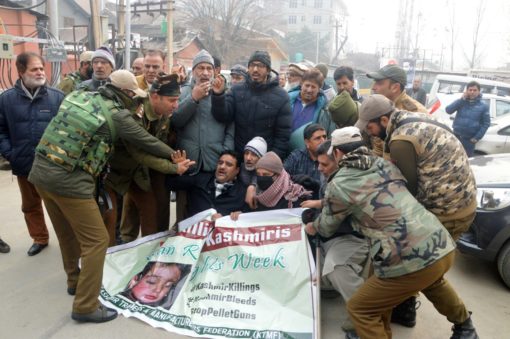Amnesty International India

Image Courtesy: Kashmir Life
On Monday afternoon, Amnesty International India released a statement strongly condemning the reading down of Article 370 by the Government of India. It notes that the Centre’s move is bound to cause unrest and wide spread protest and also fears the grave human rights violations that are likely to follow. It also criticised the placing of the state under indefinite lockdown: the cutting of communication lines, curfew and the arrests of senior political leaders. Highlighting the manners in which human rights have been repeatedly violated, it expresses deep worry that this will only increase in intensity. The entire statement has been republished below:
The unilateral decision of the Government of India to revoke the special status of Jammu and Kashmir (J&K) under the Constitution of India without consulting J&K stakeholders and amidst a complete clampdown on civil liberties and communications blackout is likely to inflame prevailing tensions, alienate the people in the state and increase the risk of further human rights violations, said Amnesty International India today.
“What J&K has been witnessing over the last few days – the additional deployment of thousands of security forces, a blanket blockade of telephone and internet services, restrictions on peaceful assembly – has already pushed the people of J&K to the edge. To make matters worse, key political stakeholders have been placed under house arrest. Important decisions about J&K are being decided by the Parliament without absolutely any consultation with the people,” said Aakar Patel, Head of Amnesty International India.
The Article 370 of the Indian Constitution, which was proposed to be scrapped by the Government of India guarantees special autonomy to the state of Jammu and Kashmir and gives independence over matters excluding foreign affairs, defence and communication. The article was seen as an essential provision to maintain the democratic relationship between India and Jammu & Kashmir. The central government has also proposed to break up the state in two union territories, which will give it an enhanced role in governance.
Former chief ministers, Omar Abdullah and Mehbooba Mufti have claimed that they are detained and placed under house arrest. Mehbooba Mufti, who was the first woman Chief Minister until the President’s Rule was imposed in the state in June 2018 tweeted “Already under house arrest & not allowed to have visitors either. Not sure how long I’ll be able to communicate. Is this the India we acceded to?” While Omar Abdullah in his official statement, said, “Those of us who gave democratic voice to the people of Jammu and Kashmir, are incarcerated as lakhs of armed security personnel have been put on the ground.”
The revocation of Article 370 is expected to cause unrest and wide scale protests in the state. So far, the government’s response to dealing with protests in the state has been heavy-handed and have led to gross human rights violations such as blinding, killing and traumatizing people over the past few years. Amnesty International India, in its earlier briefing titled ‘Losing Sight in Kashmir: The Impact of Pellet Firing Shotguns’ had documented and highlighted the use of pellet guns and other weapons in defiance of international human rights standards. While the authorities have the right to maintain public order, they must respect the right of the people to protest peacefully.
Blanket and indefinite suspensions of telecommunications services in J&K are also not in line with international human rights standards. These shutdowns affect the ability of people in Kashmir to seek, receive, and impart information, which is an integral part of the right to freedom of expression. These blackouts also impede the ability of friends and relatives to reach out and inform about their safety further increasing tensions and feelings of insecurity. “An end to the abuses in J&K cannot come without the involvement of its people,” said Aakar Patel.
First published in Amnesty International India.
